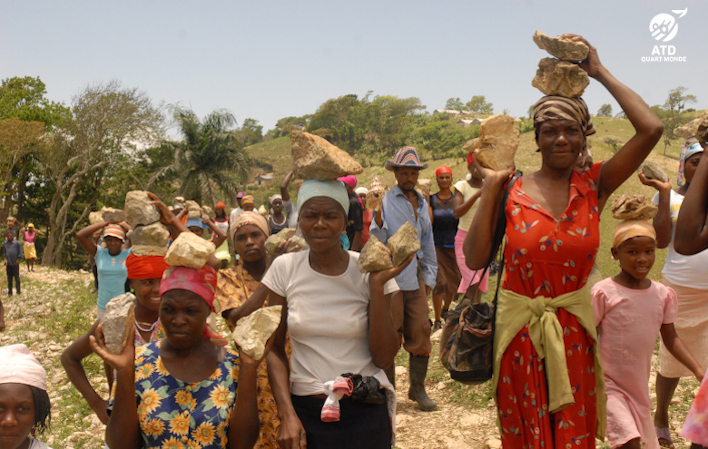Learning From Families Living in Poverty in Times of Pandemic

Speech by Isabelle Pypaert Perrin for the UN DESA Online Webinar for the International Day of Families.
 What I will share with you comes from the lives of the 150 ATD Community Groups in forty countries, in the global south and global north.
What I will share with you comes from the lives of the 150 ATD Community Groups in forty countries, in the global south and global north.
In these times of crisis, families living in poverty challenge us. They challenge us by the way they build solidarity. They challenge us by their struggle to live — and live as a family. And they challenge us also by their hopes for the future.
They challenge us by their capacity to resist the crisis together
In the middle of all the difficulties they face daily, they show incredible energy to cope and take responsibilities.
In Democratic Republic of Congo, the young people we know, who learned from their parents to take care of others, walk for miles to dialogue with people in remote neighbourhoods and try to determine how to take appropriate protective measures. This action led them to advocate to the local authorities for free access to clean water.
In the Central African Republic, young people have built “mobile washing places” to make clean water and soap available in neighbourhoods. Of course, how do you keep washing your hands when no running water is available or when the cost of a bucket of clean water has doubled?
In Guatemala and the Philippines, as in Spain and France, adults have gone out to check on their neighbours to make sure they are okay. They coordinate local initiatives to ensure that the support made available because of the crisis reaches those most in need.
Because of measures adopted to cope with the pandemic, in many countries people who depend on informal activities to survive from one day to the next are faced with a stark choice: to go out to find work and risk sanction and being infected, or to see their children starve. Without social protection, people can only rely on the solidarity of others like themselves.
All around the world families tell us:
“Of course, we are afraid of being sick, health care is not affordable for us. But what we fear the most is dying of hunger”.
This is why in Madagascar, Mrs. Louise, whose life is very difficult, shared the money she received from a cash transfer with her neighbour who was not registered because she had no official documents. This is how people resist the crisis. They share food; but each time we offer them the opportunity, they are also eager to share ideas and to think about what should change.
Families in poverty challenge us by their determination to live as a family
For many people trapped in the permanent crisis of poverty, this pandemic is one more crisis on top of the many struggles they face. Everywhere, the pandemic and the measures adopted to cope with it aggravate the situation. In the United States and in the European Union, it is now obvious that the pandemic kills more people in poor communities. And we see every day people lining up for food distributions.
- What we know less about is how these measures impact the fragile balance of family life. We must highlight this on this international day.
Family life becomes such a challenge when you must live on a very low income, locked in very small dwellings with the children out of school!
Authorities and parents from more privileged backgrounds thought that children should definitely not stop following school programmes during the pandemic, but what was put in place further increased the inequalities that already exist
How can you choose between giving food to your children and paying for the internet connection for lessons online?
How to create space for children to focus and study? How to support them when you cannot read and write?
- Enduring months without school, many children have stopped whatever learning programmes are being offered. There is a huge risk that many will never go back to school. This is a terrible blow for the families who put so much hope in education.
Another impact of this crisis concerns contacts between children in foster care and their parents. We hear almost nothing about this.
- In countries where social services are strong, many families living in poverty have their children removed into care due to confusion between neglect, inequality, and poverty. For most of these families, visits were cancelled abruptly, and parents have no information about their children.
In some cases, it took time and energy to ensure that the visits be replaced by phone calls. Because of the lockdown, some draconian decisions are taken too quickly.
Elsewhere, what about children living in the streets? How do they find their daily livelihood and a place to sleep when under curfew?
In some places we saw children removed from the street and sent to their families without any preparation. Or children are gathered into places where there are not enough educators to ensure the security and wellbeing of all.
Families living in poverty challenge us for the future!
In this time of pandemic, to save people’s lives, our leaders have been able to make decisions previously considered impossible.
- The families who endure living and struggling in the permanent crisis of poverty, which kills people, ask us for equally determined action.
And we have a road map to be ambitious; we have the Sustainable Development Goals! It is time to come together to achieve the SDGs in partnership with families in poverty.
- Making room for their experience and thinking, we can invent an education that frees every child’s potential, create social protection floors for all, and re-build an economy based on respect for human dignity and respect for the earth.
I will finish with a proposal: next year, for the International Day of Families, could we meet again, with families in poverty as active participants, to learn with them what the pandemic brought to their life and the life of their communities, what they want for the future, not only for themselves but for all, and what they expect from us?

